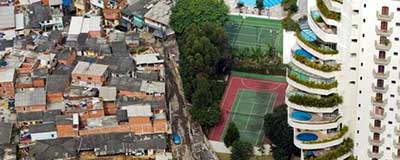Relevance: GS-3: Inclusive growth and issues arising from it, issues relating to planning, mobilization, of resources, growth, development and employment
Key Phrases: Oxfam report on Income and Wealth Inequality, Complete Equality, Vicious Cycle of Poverty, Free-Market Advocacy, Dividends of Economic Growth, Fire-sale privatization without an efficiency, Equity Calculus, Access to Good Quality Jobs
Why in News?
- An Oxfam report on income and wealth inequality was recently beset with controversy.
- While complete equality is a heartwarming concept, evidence that it ever existed in the world is weak.
- Despite Karl Marx’s clarion call of “from each according to his ability to each according to his needs”, complete equality of outcomes has been problematic for its misalignment of incentives.
Key Highlights of the Report:
- The Oxfam report released recently shows that the bottom 50% of the Indian population’s income has come down to 13.1% of the total from 20% in 1991.
- Meanwhile, the top 10%’s income, which averaged below 40% up to 1991, rose to 57.1%.
- Also, the top 10%’s wealth, which was 54% of the country’s total earlier, has ballooned to 64.6%, while that of the bottom 50% has dropped from 8.4% to 5.9%.
- Alarmingly, inequality has widened so much that the wealth of India’s bottom half is lower than that of its 98 richest people.
Is Inequality a Natural State or a Problem?
- Milton Friedman, known for his free-market advocacy, and Richard Posner, the American jurist who brought these ideas to the judiciary argued that justice requires society to maximize wealth, but this dogma has favoured the wealthy over the needy and producers over consumers.
- Oxfam's report may or may not offer perfect advice on correctives, but we cannot ignore the sets of data it has provided.
- With half our population having only 6% of all wealth, it points to a problem of pathways adopted.
- These data sets reflect deep-rooted problems of our society.
- Thus, there is nothing economic or technological about inequality, it is all political and ideological.
- It is true that society is willing to tolerate a certain degree of inequality, but a knowledge gap between perceptions and reality has resulted in extraordinarily high tolerance.
- Inequality is corrosively divisive. A high level of inequality is anti-growth because the losers are prone to a lack of trust and violence.
- Once it is clear that the dividends of economic growth are going to a relatively small group, opposition to growth can spring up.
- If we look at our own growth dividend from 1980 to 2016, a 66% share is estimated to have gone to the top 10%, 23% to the middle 40%, and the bottom 50%’s gain has been a measly 10%.
- It may be difficult to predict its impact, but surely it cannot be benign.
Factors for rising Inequality in India:
- Non-inclusive Financial Inclusion:
- Bank loans with low-interest rates are available to rich oligarchs, while the poor are driven to moneylenders.
- Automation of Jobs:
- With technology reducing low-skill job opportunities, labour earns ever less, while quality jobs have been scarce.
- This impedes social mobility critically, which is the safety valve in an unequal society.
- Poor Funding in Human Resources:
- India’s public education and health systems are broken and suffer from chronic under-funding and gaming by stakeholders.
- Private education and healthcare are too costly for most. Access is far from universal.
- This is sure to create psycho-social problems, perhaps even the conviction that the system is rigged.
- Unequal Dividends of Development:
- Glitzy infrastructure projects may reach urban skylines, but the bottom 50% may begin to feel they are not part of these developmental projects.
- This is possibly why high-decibel advertisements of development rarely resonate with this section.
Role of Ideology and politics:
- The more one studies the intricate inner workings of economic processes, the more one gets convinced that ideology and politics play a major role in our egregious widening of inequality.
- Fire-sale privatization without efficiency and equity calculus could create winners who may not deserve success.
- Insolvency proceedings could see gains made by those who drove a business bankrupt.
- A bad bank can grant big buyers access to bargain-basement-priced assets.
- All this can worsen inequality creating a vicious cycle of poverty for the poor.
Conclusion:
- While most agree that some difference in economic outcomes is necessary for an efficient economy, broad equality of opportunity is widely accepted as insignificantly low.
- Education and healthcare of reasonable quality, access to good quality jobs, nutritional security, and skill improvement opportunities are required for all, without exception.
- The Oxfam report offers data that everyone can analyse and interpret.
Source: Live-Mint
Mains Question:
Q. Ideology and Politics play a major role in widening of inequality. Discuss with reference to the recent Oxfam Report on income and Inequality.








